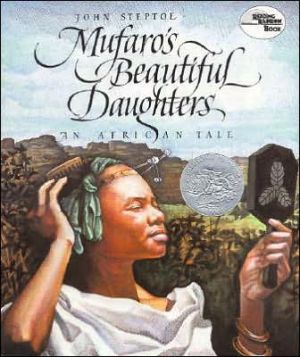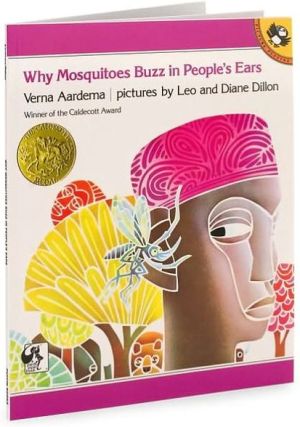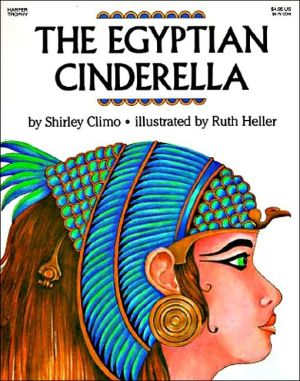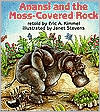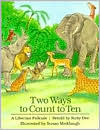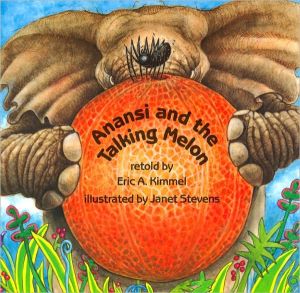Fly, Eagle, Fly: An African Tale
After a stormy night, a farmer, searching for his lost calf, finds a baby eagle that has been blown out of its nest. He takes it home and raises it with his chickens. When a friend comes to visit one day, he tells the farmer that an eagle should be flying high in the sky, not staying on the ground. "But this eagle walks like a chicken, eats like a chicken, even thinks like a chicken," the farmer replies.\ Twice, the farmer's friend tries to get the eagle to fly, but it sees the chickens on...
Search in google:
After a stormy night, a farmer, searching for his lost calf, finds a baby eagle that has been blown out of its nest. He takes it home and raises it with his chickens. When a friend comes to visit one day, he tells the farmer that an eagle should be flying high in the sky, not staying on the ground. "But this eagle walks like a chicken, eats like a chicken, even thinks like a chicken," the farmer replies.Twice, the farmer's friend tries to get the eagle to fly, but it sees the chickens on the ground and drops down each time. At last the friend, followed by the farmer, carries the young eagle back into the mountains and places the great bird on a rocky ledge, just before sunrise. As the air is filled with golden light and the sun appears, the friend cries, "Fly, Eagle, fly!" and the eagle raises its wings and soars upward, out of sight.This simply told yet dramatic story from Africa will delight children everywhere and encourage them to "lift off and soar," as Archbishop Tutu puts it in his foreword. In lovely, expressive paintings of great beauty, sparked with touches of humor, Niki Daly, an internationally known artist, catches the essence of this powerful tale.Publishers WeeklyA favorite African fable, attributed to the Ghanaian educator Aggrey of Africa, soars in this superb inspirational picture book set in the Transkei region of South Africa. An African man discovers an abandoned, newly hatched eaglet and brings it back to his village, where he raises it among the chickens. Knowing no other life, the eagle clucks, pecks and stays on the ground just like the chickens, until a visitor to the village tries to set things right. With determination, the visitor insists that the eagle be restored to its birthright: "You belong not to the earth, but to the sky. Fly, eagle, fly!" Daly's airy, dusty-hued watercolors celebrate both the serene beauty of a South African landscape and the gentle, humming rhythm of village life. Gregorowski, an Anglican priest, once worked in the Transkei; in an endnote, he explains the tale's religious and political significance and poignantly reveals that he retold this tale many years ago for his terminally ill daughter ("I wanted her to understand that we are all born to be eagles who are lifted up with the might of the Spirit"). A preface by Archbishop Desmond Tutu distills the book's powerful and peaceful spirituality. Ages 5-9. (Jan.) Copyright 2000 Cahners Business Information.\|
Foreword by Archbishop Desmond Tutu\ Fly, Eagle, Fly! is a charming and innovative adaptation of an African tale attributed to a Ghanaian, James Kwegyir Aggrey — also known as Aggrey of Africa. How frequently we have thought that we were chickens destined to spend our lives limited to an earthly existence with limited horizons, whereas we are made for something far more noble. We are made for the sublime, the transcendent. We are not bound to this earth and a humdrum existence but are made for something truly glorious: We are not mere chickens but eagles destined to soar to sublime heights; we are made for freedom and laughter and goodness and love and eternity, despite all appearances to the contrary. We should be straining to become what we have it in us to become; to gaze at the rising sun and lift off and soar.\ Christopher Gregorowski is a wonderfully creative and gifted person, and how deeply moving and poignant it is to think of what gave rise to Fly, Eagle, Fly! — it was written for his dying child.\ Thank God for Christopher's giftedness — he has enriched us all.\ Text copyright © 2000 by Christopher Gregorowski\ Illustrations copyright © 2000 by Niki Daly
\ Publishers Weekly\ - Publisher's Weekly\ A favorite African fable, attributed to the Ghanaian educator Aggrey of Africa, soars in this superb inspirational picture book set in the Transkei region of South Africa. An African man discovers an abandoned, newly hatched eaglet and brings it back to his village, where he raises it among the chickens. Knowing no other life, the eagle clucks, pecks and stays on the ground just like the chickens, until a visitor to the village tries to set things right. With determination, the visitor insists that the eagle be restored to its birthright: "You belong not to the earth, but to the sky. Fly, eagle, fly!" Daly's airy, dusty-hued watercolors celebrate both the serene beauty of a South African landscape and the gentle, humming rhythm of village life. Gregorowski, an Anglican priest, once worked in the Transkei; in an endnote, he explains the tale's religious and political significance and poignantly reveals that he retold this tale many years ago for his terminally ill daughter ("I wanted her to understand that we are all born to be eagles who are lifted up with the might of the Spirit"). A preface by Archbishop Desmond Tutu distills the book's powerful and peaceful spirituality. Ages 5-9. (Jan.) Copyright 2000 Cahners Business Information.\|\ \ \ \ \ Children's Literature\ - Heidi Green\ The child herders of an African village fail to bring a farmer's calf back at the end of one day. After a storm rocks the village all night long, the farmer sets out to search for his cow. Instead, he finds an eagle that has fallen from its nest. He decides to bring it with him to the village and train it to be a chicken. As the eagle grows, it does in fact adopt the manners of its fellow domesticated birds. It is a thing of ridicule among the village children, who believe it is just an odd-looking chicken. Then, one day, a visiting friend of the farmer's notices that the "chicken" is actually an eagle. To the farmer's amusement, the friend attempts to return the eagle to its native sky. The eagle, though, sees his companion chickens and refuses to leave the life he has known. Finally, the friend develops a plan. If only the noble bird could see the sun rising, he thinks, it could not help but follow it up and into the sky. Gregorowski's text is an appealing version of a familiar African tale, originally recounted for his terminally ill daughter. Niki Daly's splendid, full-color illustrations are not to be missed.\ \ \ School Library JournalK-Gr 4-"A farmer went out one day to search for a lost calf-." He finds not the calf, however, but an orphaned eaglet. He takes it home, and having placed it among his hens and roosters, says to his family: "The eagle is the king of the birds-but we shall train it to be a chicken." As the eaglet grows, it begins to walk, talk, eat, and, according to the farmer, think like a chicken. When a friend remarks upon this eagle in the chicken yard, the farmer insists it's a chicken, and the friend sets out to prove him wrong. His first attempts fail as the bird ignores his plea of "Fly, eagle, fly!" Finally, before dawn one morning, the two friends carry the now heavy, full-grown eagle to the mountaintop where the farmer had first found it. Here, as the sun rises, the eagle finally takes off and soars, realizing its true destiny at last. Younger children will enjoy the book simply as a story; older readers can relate to the struggle to discover their true selves, and it is a most effective parable about the plight of the people of South Africa. An author's note attributes the original tale to the Ghanaian known as Aggrey of Africa. Daly's watercolor illustrations are outstanding, perhaps the artist's finest to date. They are a striking combination of soft blues and browns that bring the setting to life and add considerably to the book's distinction.-Grace Oliff, Ann Blanche Smith School, Hillsdale, NJ Copyright 2000 Cahners Business Information.\|\ \

